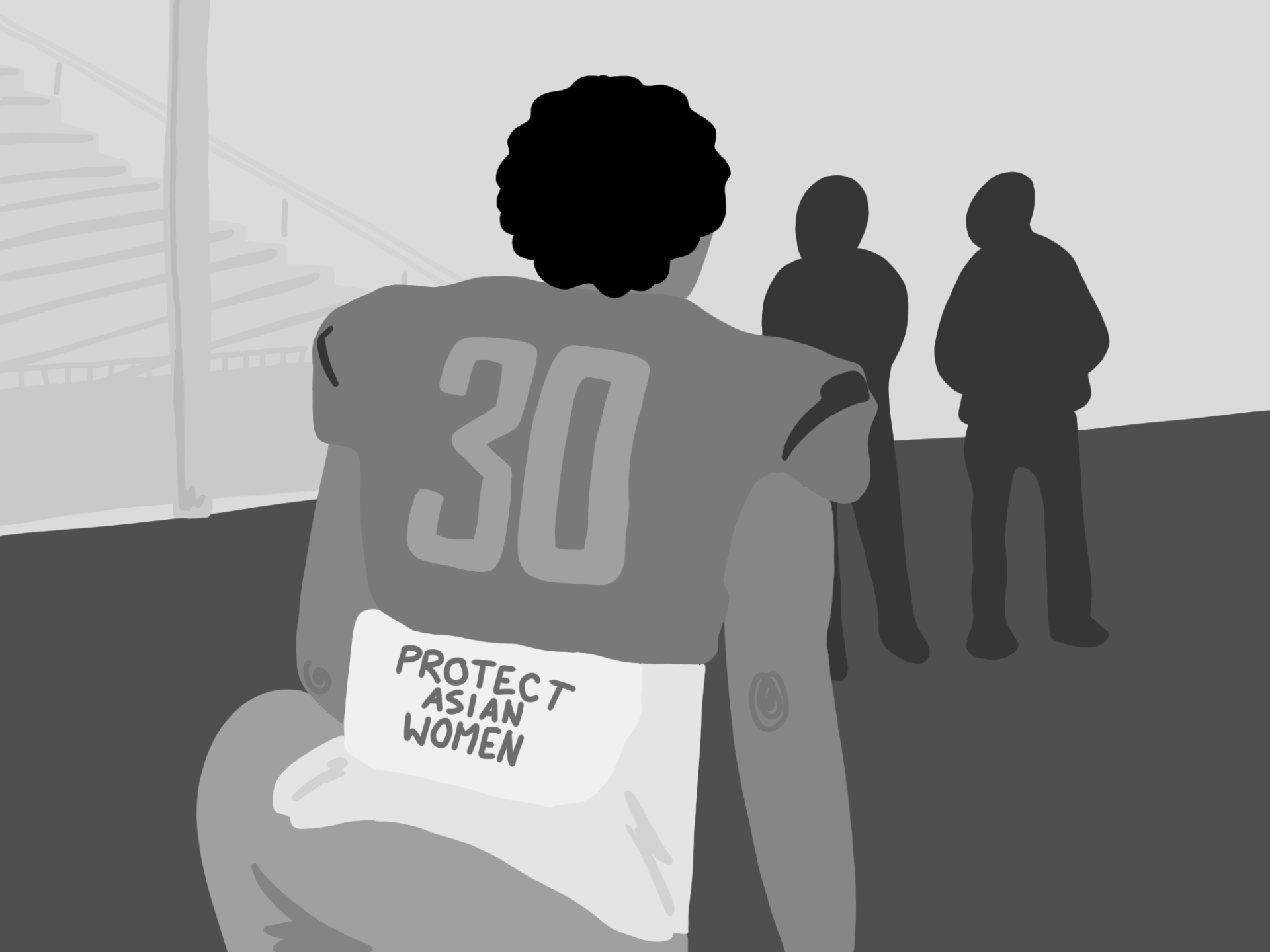
In the last two years, it has become increasingly common for Lewis & Clark sports teams to make statements on various social and political movements. On the @lcpiossfb Instagram, there is an image of an LC football player kneeling while wearing a sign reading “protect Asian women” below the back of their jersey. On the @lcpiosswim Instagram, there is a post about Black Lives Matter that starts with “the first commitment we can make is to LISTEN.” Individual athletes have made posts about their own experiences and advocated for change as well.
Point guard Bille Sheikh ’24 is one such athlete who supports social justice. Sheikh is not currently playing on LC’s basketball team due to an injury, but he is still very active with The Locker Room, the Office of Inclusion and Multicultural Engagement’s Men of Color Collective. Sheikh sees that the transition to a predominantly white institution can be rough for some athletes. He has been working to create opportunities and a sense of community for male athletes of color on campus. Sheikh grew up living in the United States and Japan and experienced marginalization in both places. In addition, his experiences as an athlete influenced his views on racial discrimination and the push for equality.
“It just made me really passionate,” Sheikh said. “We want to be treated equally, and things are so different everywhere around the world. When I see my little brother who is in middle school now, I don’t want him to go through what I did. I just want to educate everyone and do the best I can.”
For almost as long as there have been athletes in America, BIPOC athletes have used their popularity to call attention to social justice issues. One well-known example is the formation of the Olympic Project for Human Rights, which led to the Black Power Salute protest by two African American athletes. It is an iconic image, with Tommie Smith and John Carlos standing on the podium at the 1968 Summer Olympics in Mexico City, eyes cast down, fists in the air, protesting South African apartheid, racism in the U.S. and the mistreatment of Black people around the world.
This was partly orchestrated by Dr. Harry Edwards, professor emeritus of sociology at the University of California, Berkeley. As a former student-athlete and current activist-scholar, he spent his career focusing on the experiences of other African American athletes. Edwards’ life and work indicate that sports are a window into society, illuminating a wide range of social and political challenges that affect our culture. However, Edwards has seen an intolerance toward allowing athletes to use sports as a platform to speak on important issues.
“When you come up against the media and are unwilling to play the game, then you are essentially cast aside, turned essentially into a non-person because they no longer have any use for you,” Edwards said in an NPR interview.
A number of the LC football team’s Black players have replicated the Black Power salute during the national anthem for all four years that Ariel Blemur ’22 has been a defensive lineman on the team. It was reportedly started by Marvin Pusung-Zita ’22, whose high school made the news for kneeling during the national anthem before their games.
“I did it for every game of my career mainly because, especially out in Portland, people think the narrative is different,” Blemur said. “They think the fight is already over. They think equality has already been achieved, but there (are) still discrepancies that Black people have to deal with all the time that can often go ignored … The whole point of keeping our fist in the air was to make sure people knew there was a fight going on, still, injustices that need to be righted, still work to be done.”
This was inspired by Colin Kaepernick, who began protesting police violence against racial minorities in the U.S. in 2016, first by sitting during the national anthem and later kneeling. It was an action that eventually cost him his career in the National Football League. At around the same time, WNBA stars like Maya Moore and Seimone Augustus spoke out against police shootings of Black people. The Minnesota Lynx wore T-shirts with the names of Philando Castile and Alton Sterling on the back and the words “change starts with us, justice, and accountability” on the front.
Blemur has been thankful that his coaches have supported their team’s decision to engage in such protests.
“I feel like you can’t work for an organization that doesn’t support you as a person or support the struggle that you are going through,” Blemur said.
In 2020, the National Collegiate Athletic Association (NCAA) Playing Rules Oversight Panel approved rules to “allow student-athletes in all sports to wear patches on their uniforms for commemorative and memorial purposes, as well as to support social justice issues.”
The NCAA does not have an official policy on student activism, nor do they have a policy on hate speech. They acknowledge that students athletes have a platform, and in 2020 provided a list of tips for students looking to promote their messages. In the NCAA 2021-2022 Divison Manual, they state that “all participating student-athletes shall act with honesty and sportsmanship at all times so that intercollegiate athletics as a whole, their institutions and they, as individuals, shall represent the honor and dignity of fair play and the generally recognized high standards associated with wholesome competitive sports.”
Whether advocating for social justice or sharing the message of hate groups, it is unclear what consequences student athletes face that post on social media.
Subscribe to the Mossy Log Newsletter
Stay up to date with the goings-on at Lewis & Clark! Get the top stories or your favorite section delivered to your inbox whenever we release a new issue.

Leave a Reply